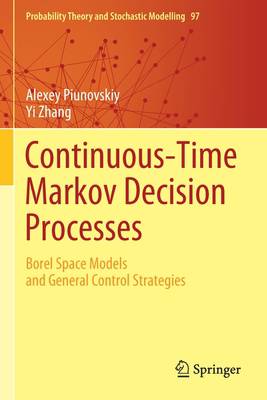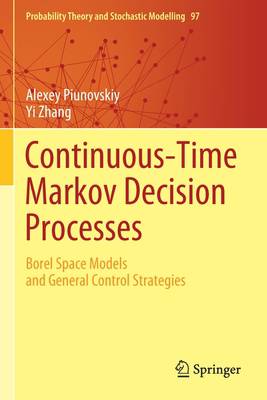
- Retrait gratuit dans votre magasin Club
- 7.000.000 titres dans notre catalogue
- Payer en toute sécurité
- Toujours un magasin près de chez vous
- Retrait gratuit dans votre magasin Club
- 7.000.0000 titres dans notre catalogue
- Payer en toute sécurité
- Toujours un magasin près de chez vous
Continuous-Time Markov Decision Processes
Borel Space Models and General Control Strategies
Alexey Piunovskiy, Yi ZhangDescription
This book offers a systematic and rigorous treatment of continuous-time Markov decision processes, covering both theory and possible applications to queueing systems, epidemiology, finance, and other fields. Unlike most books on the subject, much attention is paid to problems with functional constraints and the realizability of strategies.
Three major methods of investigations are presented, based on dynamic programming, linear programming, and reduction to discrete-time problems. Although the main focus is on models with total (discounted or undiscounted) cost criteria, models with average cost criteria and with impulsive controls are also discussed in depth.
The book is self-contained. A separate chapter is devoted to Markov pure jump processes and the appendices collect the requisite background on real analysis and applied probability. All the statements in the main text are proved in detail.
Researchers and graduate students in applied probability, operational research, statistics and engineering will find this monograph interesting, useful and valuable.
Spécifications
Parties prenantes
- Auteur(s) :
- Editeur:
Contenu
- Nombre de pages :
- 583
- Langue:
- Anglais
- Collection :
- Tome:
- n° 97
Caractéristiques
- EAN:
- 9783030549893
- Date de parution :
- 11-11-21
- Format:
- Livre broché
- Format numérique:
- Trade paperback (VS)
- Dimensions :
- 156 mm x 234 mm
- Poids :
- 839 g

Les avis
Nous publions uniquement les avis qui respectent les conditions requises. Consultez nos conditions pour les avis.






